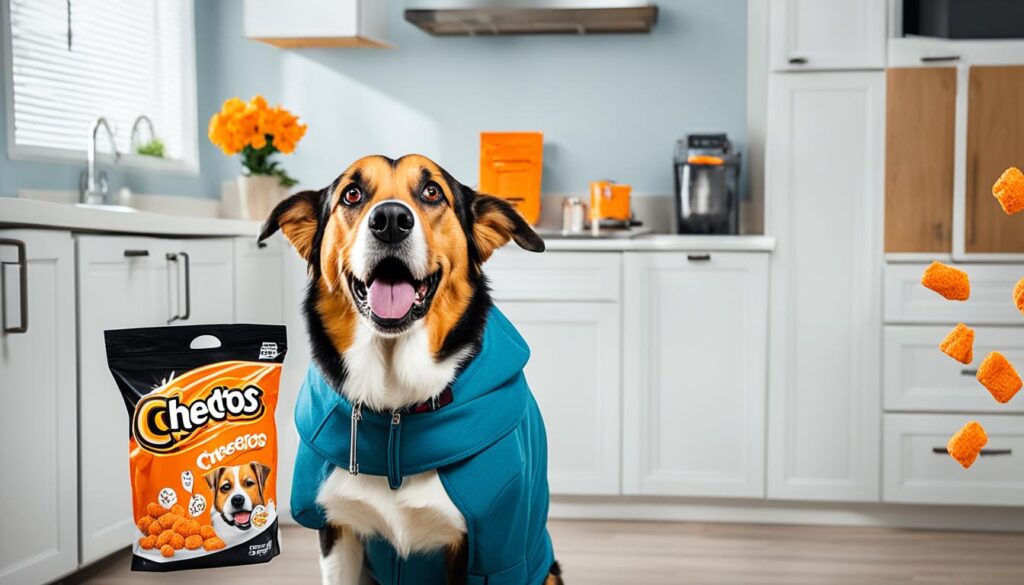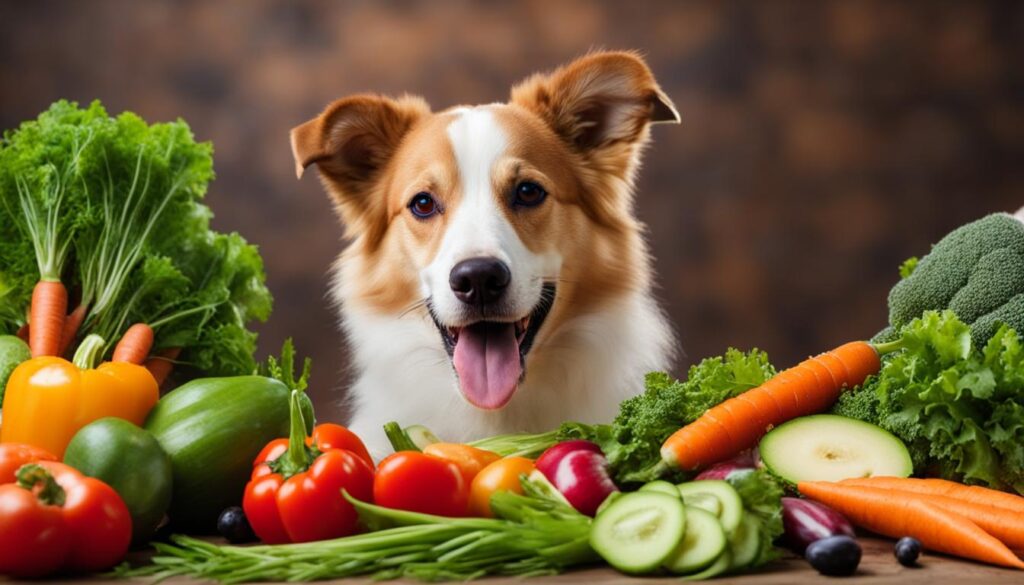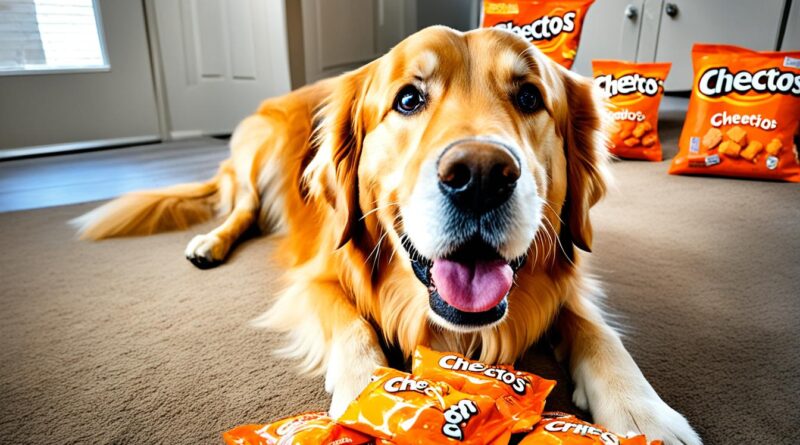Can Dogs Have Cheetos? Pet Safety Guide
Many dog owners wonder if it’s safe to feed their furry friends Cheetos. However, it’s best to avoid sharing human snacks with dogs, including Cheetos. These cheesy snacks contain artificial additives, salt, preservatives, and lack nutritional value for dogs. Too much salt can lead to dehydration, certain ingredients may trigger allergies or adverse reactions, and the shape and texture of Cheetos can be a choking hazard. In 2019, a dog developed acute pancreatitis after consuming a large quantity of Cheetos due to their high fat content. To keep dogs safe and healthy, it’s recommended to choose healthier treat alternatives specifically made for dogs.
Key Takeaways:
- It’s best to avoid feeding Cheetos and other human snacks to dogs
- Cheetos contain artificial additives, salt, preservatives, and lack nutritional value for dogs
- Too much salt can lead to dehydration and certain ingredients may trigger allergies in dogs
- The shape and texture of Cheetos can be a choking hazard for dogs
- Choosing healthier treat alternatives specifically made for dogs is recommended
Can Dogs Eat Cheetos?
The debate surrounding the consumption of Cheetos by dogs has garnered significant attention among pet owners. While dogs can technically eat Cheetos without suffering acute toxicity, it is not recommended to include them as a regular treat in their diet. Cheetos contain high levels of sodium and artificial additives, which can be harmful to dogs and compromise their overall health.
The cheese dust found on Cheetos can potentially cause digestive issues in dogs, leading to gastrointestinal discomfort. Additionally, the crunchy texture of Cheetos poses a choking hazard, particularly for smaller dog breeds. It is crucial to prioritize a dog’s well-being and consider potential risks before introducing any new food or treat into their diet.
“While dogs can technically consume Cheetos without immediate harm, it is not recommended to feed them to dogs. Cheetos lack nutritional value and contain high levels of salt, unhealthy fats, and artificial additives that can lead to various health issues in dogs.”
In addition to the aforementioned concerns, the high fat content present in Cheetos can contribute to obesity among dogs, which in turn can lead to further health complications. Obesity in dogs may result in joint problems, heart disease, diabetes, and a decreased quality of life. Therefore, it is essential to prioritize a dog’s health and consult with a veterinarian before introducing any new food or treat.
“It’s important to prioritize a dog’s health and consult with a veterinarian before introducing any new food or treats into their diet.”
In conclusion, while dogs can technically eat Cheetos without immediate harm, it is not recommended due to their high sodium, artificial additives, and lack of nutritional value. It is crucial to prioritize a dog’s health by selecting healthier and more suitable treat options specifically designed for dogs. Consulting a veterinarian for personalized advice ensures that a dog’s diet is balanced and tailored to their individual needs, ultimately keeping them safe and healthy.
Potential Health Issues for Dogs from Eating Cheetos
Dogs may experience several potential health issues from consuming Cheetos. The high fat and salt content in Cheetos can lead to digestive problems such as diarrhea, vomiting, and stomach ache. Excessive consumption of Cheetos can also contribute to obesity in dogs, which can lead to further health complications. Dogs can also experience sodium overload from consuming too much salt, which can stress the kidneys and cause long-term damage. Some ingredients in Cheetos, such as artificial flavors or preservatives, may also trigger allergies in dogs, resulting in itching, skin irritation, or other allergic reactions. The crunchy texture of Cheetos can pose a choking hazard and the high fat content increases the risk of pancreatitis, a potentially fatal inflammation of the pancreas.
Health Issues from Eating Cheetos at a Glance
| Health Issues | Impact on Dogs |
|---|---|
| Digestive Problems | Diarrhea, vomiting, stomach ache |
| Obesity | Potential weight gain and associated health complications |
| Sodium Overload | Stress on the kidneys, long-term damage |
| Allergic Reactions | Itching, skin irritation, allergic responses |
| Choking Hazard | Crunchy texture poses a risk, especially for smaller breeds |
| Pancreatitis | Increased risk due to high fat content |
To illustrate the potential health issues associated with Cheeto consumption, here is a quote from a renowned veterinarian:
“The high fat and salt content in Cheetos can have adverse effects on a dog’s health. Digestive problems, obesity, sodium overload, allergic reactions, and the risk of pancreatitis are among the potential health issues dogs may face if they consume Cheetos regularly.” -Dr. Emily Johnson, DVM
It’s crucial to prioritize the well-being of our furry companions by avoiding the temptation to share Cheetos with them. Choosing alternative, healthier treat options specifically made for dogs ensures their nutritional needs are met and reduces the risk of potential health complications.
What to Do If a Dog Consumes Cheetos Accidentally
If a dog accidentally consumes Cheetos, immediate action is essential to ensure their well-being. Follow these steps to address the situation:
- Assess the situation: Look for any signs of distress or adverse reactions in the dog. These may include vomiting, diarrhea, excessive thirst, or lethargy.
- Contact a veterinarian: Get in touch with a veterinarian immediately and inform them about the quantity of Cheetos ingested by the dog and any observed symptoms. The veterinarian will be able to provide guidance based on the specific situation.
- Monitor the dog: Keep a close eye on the dog’s behavior, appetite, energy levels, and bathroom habits for any changes. If any concerns arise, inform the veterinarian promptly.
- Prevention: Ensure that Cheetos and other harmful substances are securely stored and kept out of the dog’s reach to avoid accidental ingestion.
Remember that professional advice tailored to a dog’s specific needs is crucial. Consulting with a veterinarian is essential to address any potential health risks and ensure the dog’s safety and well-being.

Alternatives to Cheetos for Dogs
While Cheetos may not be a suitable snack for dogs, there are plenty of healthier alternatives available. Here are some nutritious options that your furry friend will love:
| Treat | Description |
|---|---|
| Carrot Sticks | A crunchy and low-calorie snack packed with vitamins and fiber. |
| Apple Slices (without seeds or core) | A refreshing and natural treat that provides a dose of antioxidants and promotes dental health. |
| Peanut Butter (without xylitol) | A tasty and protein-rich treat, but be sure to choose a brand that doesn’t contain the toxic sweetener xylitol. |
| Baked Sweet Potato Chips | A flavorful and nutritious alternative to regular potato chips, loaded with vitamins and fiber. |
These alternatives are safe for dogs and offer nutritional benefits. However, it’s important to offer them in moderation and consult with a veterinarian to ensure they are suitable for your dog’s individual dietary needs.
Additionally, there is a wide variety of dog-approved treats specifically made to provide the necessary nutrition for dogs and keep them healthy and happy. These treats are formulated with quality ingredients and are designed to cater to different breeds, sizes, and dietary preferences. Consulting with a veterinarian can help you choose the best treat options for your furry companion.

Remember, finding suitable alternatives to Cheetos will not only satisfy your dog’s cravings but also contribute to their overall well-being.
Can Dogs Eat Cheetos Chips?
While dogs can technically eat Cheetos chips, it is not recommended due to their lack of nutritional value and potential health risks. Cheetos chips are high in salt and unhealthy fats, which can have detrimental effects on a dog’s well-being.
The high salt content in Cheetos chips can lead to dehydration and electrolyte imbalances in dogs, which may result in various health issues. Additionally, the unhealthy fats present in these chips can contribute to obesity and heart disease in dogs, posing significant risks to their long-term health.
Although a small amount of Cheetos chips may not cause immediate harm, continuous consumption or larger quantities can have long-term negative effects on a dog’s overall health and well-being. Therefore, it is crucial to prioritize a dog’s well-being by choosing healthier treat options specifically designed to meet their nutritional needs.
| Health Risks of Cheetos Chips for Dogs | Benefits of Choosing Healthier Treats |
|---|---|
|
|
By selecting healthier treat options, such as natural snacks like carrots or apples, pet owners can ensure that their dogs receive the necessary nutrition and avoid the potential health risks associated with Cheetos chips. It is always advisable to consult with a veterinarian to determine the most suitable dietary choices for a dog’s individual needs.
Can Dogs Eat Cheese Puffs?
Dogs should not eat cheese puffs, including Cheeto puffs. These snacks contain high amounts of salt, which can be harmful to a dog’s health. Consuming too much salt can lead to sodium ion poisoning, resulting in symptoms such as vomiting, diarrhea, depression, tremors, high temperature, seizures, and other serious health issues. While a small amount of cheese puffs may not cause immediate harm, it’s best to avoid feeding them to dogs regularly. Instead, opt for healthier treat alternatives that provide nutritional benefits without the risks associated with cheese puffs.
| Treat Alternatives for Dogs | Nutritional Benefits |
|---|---|
| Carrot sticks | Rich in vitamins and fiber |
| Apple slices (without seeds or core) | Provide vitamins and antioxidants |
| Peanut butter (without xylitol) | Good source of healthy fats and protein |
| Baked sweet potato chips | High in fiber and contain essential nutrients |
Note: While these alternatives are generally safe for dogs, it’s important to introduce them gradually and in moderation to prevent any digestive upset. Always consult with a veterinarian to ensure they are suitable for your dog’s specific dietary needs.
Seek Veterinary Advice
If you have any concerns about your dog’s diet or if they have accidentally consumed cheese puffs, it’s crucial to reach out to your veterinarian for guidance. They can provide tailored advice and address any potential health issues that may arise. Remember, prevention is key when it comes to keeping your furry friend safe and healthy.
Conclusion
After considering the potential risks and health concerns, it is clear that feeding dogs Cheetos is not recommended. These popular cheesy snacks lack nutritional value and contain high levels of salt, unhealthy fats, and artificial additives that can have negative effects on a dog’s health.
Dogs are prone to digestive problems, obesity, sodium overload, allergic reactions, choking hazards, and increased risk of pancreatitis when consuming Cheetos or similar human snacks. To ensure the well-being of our canine companions, it is essential to prioritize their health and choose healthier treat alternatives specifically made for dogs.
Instead of sharing Cheetos with your furry friend, consider offering natural snacks like carrots or apples, which are safe and nutritious. Consulting with a veterinarian is always recommended to determine the best diet and treat options for your dog’s individual needs.
By making informed decisions and providing appropriate nutrition, pet owners can keep their dogs healthy, happy, and protected from the potential dangers associated with Cheetos and other similar snacks.
FAQ
Can dogs have Cheetos?
It is best to avoid feeding dogs Cheetos. These snacks contain artificial additives, high levels of salt, and lack nutritional value for dogs.
Can dogs eat Cheetos?
While dogs can technically eat Cheetos, it is not recommended due to the potential health risks associated with the high levels of salt, unhealthy fats, and artificial additives in these snacks.
what are the potential health issues for dogs from eating Cheetos?
Dogs may experience digestive problems, obesity, sodium overload, allergic reactions, choking hazards, and an increased risk of pancreatitis from consuming Cheetos.
What should I do if a dog consumes Cheetos accidentally?
If a dog accidentally consumes Cheetos, it is important to contact a veterinarian and monitor the dog for any signs of distress. Immediate action may be required depending on the situation.
What are some alternatives to Cheetos for dogs?
Healthier alternatives to Cheetos for dogs include carrot sticks, apple slices, peanut butter without xylitol, and baked sweet potato chips. It is important to offer these alternatives in moderation and consult with a veterinarian for individual dietary needs.
Can dogs eat Cheetos chips?
Dogs can technically eat Cheetos chips, but it is not recommended due to their lack of nutritional value and potential health risks such as dehydration, obesity, and heart disease.
Can dogs eat cheese puffs?
Dogs should not eat cheese puffs, including Cheeto puffs, as they contain high amounts of salt that can be harmful to a dog’s health, leading to sodium ion poisoning and other serious health issues.
What is the conclusion about dogs and Cheetos?
While Cheetos may not be acutely toxic to dogs, it is best to avoid feeding them to dogs due to their lack of nutritional value and potential health risks. It is recommended to choose healthier treat alternatives specifically made for dogs to keep them safe and healthy.


